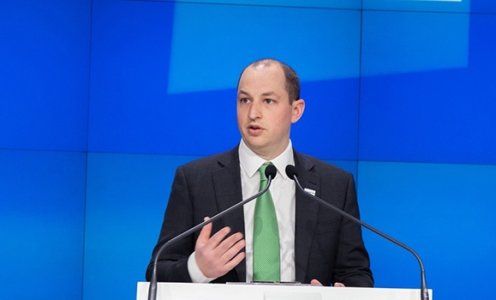Spotlight: Chris Burns

Under the leadership of Chris Burns, NOVONIX is positioned to do work that has a direct and
positive impact on people’s lives (supplied photo).
Chris Burns (MSc’11, PHD’15) has a finger on the pulse of clean tech.
by Jodi Reid
It was while studying at Dal in Jeff Dahn’s battery tech research team that Chris Burns (MSc’11, PhD’15) discovered his passion for the critical role lithium-ion batteries would play in the transition of society to clean technology.
“When I started working with Jeff Dahn, I saw the opportunity to make a real societal impact that people could understand,” Burns says. That idea took root, and Dr. Burns’ journey as a clean tech pioneer began.
Today, Dr. Burns is the CEO of NOVONIX, a leading supplier of battery materials and technologies driving the innovation required for a more sustainable future. He co-founded the company in 2013 while working on his PhD, when he recognized the tremendous potential and appetite for battery technology to help reduce the world’s carbon footprint. With NOVONIX, Burns is bringing battery technology to market that supports longer life batteries, higher energy efficiency, and a smaller environmental impact.
Dr. Burns is encouraged by the massive regulatory changes and government investment he is seeing in the field in North America.
“The US set aggressive targets where to qualify for electric vehicle rebates, by 2028, 100 per cent of the value of the battery’s components must be manufactured or assembled in North America—that’s incredible considering that today almost the entire supply chain currently rests in Asia,” he says. “Governments are incentivising industries around the world to grow a domestic supply chain, particularly in the United States, but the US still needs to do more to catch up with China. NOVONIX currently has plans to bring on 150,000 tonnes of synthetic graphite supply by 2030, but this would still only represent 2 per cent of global demand.”
Thanks to Dr. Burns’ prescient timing, NOVONIX is well ahead of the trend. In 2017, the company moved toward producing synthetic graphite in its new plant in Chattanooga, Tennessee—one of the first companies in North America working to manufacture this key ingredient for longer battery life. Producing synthetic graphite in North America with cleaner process technologies could decrease its global warming potential by as much as 60 per cent compared to Asian-made synthetic graphite as demonstrated in the company’s life cycle assessment conducted earlier this year.
“We saw the massive change coming to renewable energy generation and storage, and we invested in the development of cleaner process technology,” says Dr. Burns. “There are very few companies in our space outside of Asia—other people saw risk where we saw opportunity.”
That opportunity is paying off, with major energy and auto companies now eyeing NOVONIX technologies, and some already investing heavily in the company, such as Phillips 66, which invested US$150 million last year. US President Joe Biden further recognized the company’s potential this fall, announcing a US$150 million Department of Energy grant to NOVONIX.
Now, Dr. Burns’ desire to do work that would have a direct and positive impact on people’s lives feels like it’s coming to fruition.
“Our goal is to one day soon be able to point at an electric vehicle and say, ‘Our materials are in that car.’ That’s the kind of impact that motivates us every day, and that’s very exciting.”